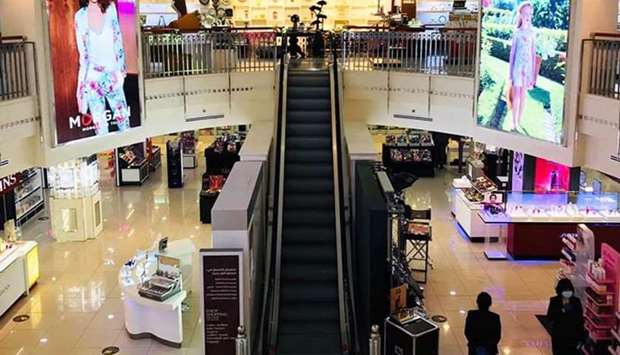Qatar’s retail segment is experiencing the advent of new operational models such as ‘revenue share’ deals, which according to KPMG, “offer a combination of base rent and turnover percentage to ease the rental burden on retailers.”
“This is also beneficial in attracting new tenants, as we foresee more retailers opting for this route over the short to mid-term,” KPMG said in the ‘Qatar Real Estate Rental Index Q1, 2016 – Q2, 2021’ report.
The organised retail mall segment registered a relatively softer decline on the rental index by 2.9% compared to the material drop of 9.6% experienced primarily due to the onset of the pandemic during Q3 and Q4 2020.
The same period (Q1 and Q2) during 2020 had recorded a drop of 2.5%. The malls in Qatar with stable occupancy levels experienced a drop of approximately 1.8% in the asking rentals over Q1 and Q2, 2021.
The malls having occupancy of less than 80% (including the upcoming malls) experienced a slightly higher decline in asking rentals i.e., 3.4% on the rental index.
Changing the momentum experienced over the last year, Q1 and Q2 2021 registered improved leasing activity with several new and existing brands occupying organised retail spaces in the leading malls across Qatar.
The declining rentals remain in favour of the retailers, as major developers/mall operators continue to offer incentives to attract and retain tenants such as rent-free periods, freezing rent periods, and extended fit-out periods, KPMG said.
After witnessing a drop of 8.4% during the last two quarters (Q3 and Q4) of 2020, the rentals for the commercial office segment have experienced significant improvement with just a 1% decline on the rental index during Q1 and Q2 2021.
The same period (Q1 and Q2) during 2020 experienced a similar decline of 1.5% on the office rental index. Office rentals in the central business district are witnessing promising signs of stability.
Hopefully, with the uptick in the economic activity, a possible recovery can be expected. Secondary business districts experienced a moderate decline of 1.4%. This was primarily due to landlords/developers pricing their products competitively due to an increase in supply.
“We believe that this decline is exerting pressure on the rentals for office spaces in the peripheral business district, which registered a drop of more than 9% during Q1 and Q2 2021. As per our interactions with the industry stakeholders, the market continues to remain tenant-favoured with relatively subdued demand and geared towards requirements of smaller office spaces with fitted-out options,” KPMG said.
Large shell and core requirements were relatively less, particularly those originating from the private sector. Interestingly, the demand for co-working spaces and serviced office suites continues to show improvement, with many small and emerging enterprises opting for reduced real estate costs through shared spaces, the report noted.
“This is also beneficial in attracting new tenants, as we foresee more retailers opting for this route over the short to mid-term,” KPMG said in the ‘Qatar Real Estate Rental Index Q1, 2016 – Q2, 2021’ report.
The organised retail mall segment registered a relatively softer decline on the rental index by 2.9% compared to the material drop of 9.6% experienced primarily due to the onset of the pandemic during Q3 and Q4 2020.
The same period (Q1 and Q2) during 2020 had recorded a drop of 2.5%. The malls in Qatar with stable occupancy levels experienced a drop of approximately 1.8% in the asking rentals over Q1 and Q2, 2021.
The malls having occupancy of less than 80% (including the upcoming malls) experienced a slightly higher decline in asking rentals i.e., 3.4% on the rental index.
Changing the momentum experienced over the last year, Q1 and Q2 2021 registered improved leasing activity with several new and existing brands occupying organised retail spaces in the leading malls across Qatar.
The declining rentals remain in favour of the retailers, as major developers/mall operators continue to offer incentives to attract and retain tenants such as rent-free periods, freezing rent periods, and extended fit-out periods, KPMG said.
After witnessing a drop of 8.4% during the last two quarters (Q3 and Q4) of 2020, the rentals for the commercial office segment have experienced significant improvement with just a 1% decline on the rental index during Q1 and Q2 2021.
The same period (Q1 and Q2) during 2020 experienced a similar decline of 1.5% on the office rental index. Office rentals in the central business district are witnessing promising signs of stability.
Hopefully, with the uptick in the economic activity, a possible recovery can be expected. Secondary business districts experienced a moderate decline of 1.4%. This was primarily due to landlords/developers pricing their products competitively due to an increase in supply.
“We believe that this decline is exerting pressure on the rentals for office spaces in the peripheral business district, which registered a drop of more than 9% during Q1 and Q2 2021. As per our interactions with the industry stakeholders, the market continues to remain tenant-favoured with relatively subdued demand and geared towards requirements of smaller office spaces with fitted-out options,” KPMG said.
Large shell and core requirements were relatively less, particularly those originating from the private sector. Interestingly, the demand for co-working spaces and serviced office suites continues to show improvement, with many small and emerging enterprises opting for reduced real estate costs through shared spaces, the report noted.


